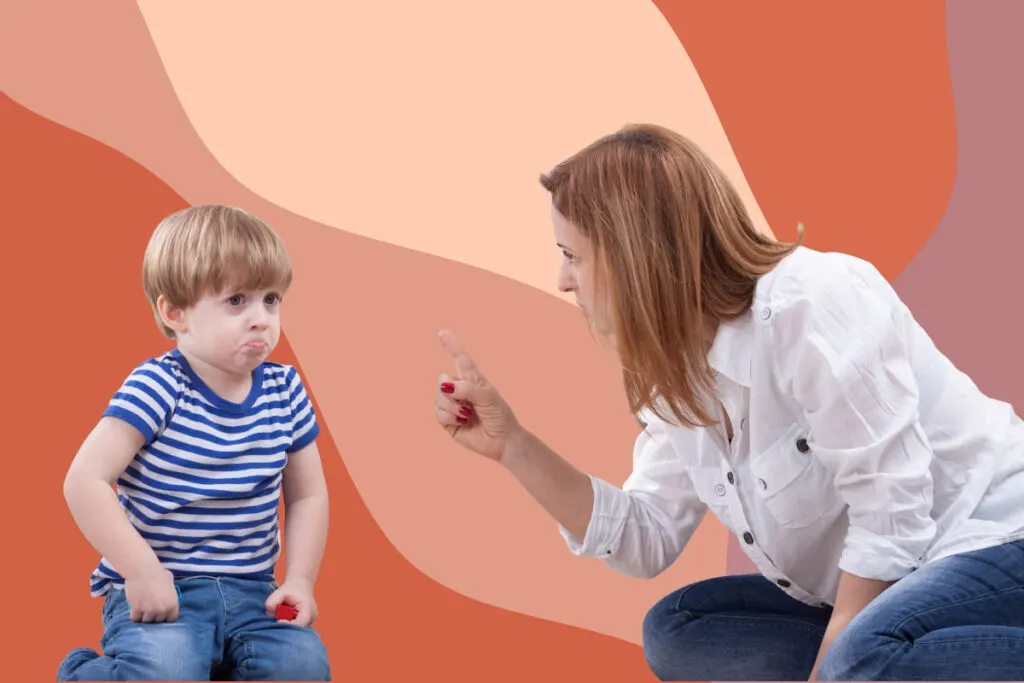- What is punishment
- Why punishment doesn’t work
- Misconceptions about punishment
- What to do when punishment doesn’t work
Parents are often surprised and frustrated when no punishment works for their children.
There are many reasons why punishment doesn’t work.
Knowing those reasons will enable parents to avoid the pitfalls.
TABLE OF CONTENTS
- What is punishment
- Why punishment doesn’t work
- It doesn’t teach good behavior or the reason for it
- It incentivizes maladaptive behavior
- It doesn’t promote conscience
- It impedes learning new behavior
- It models aggression
- It encourages attention-seeking behavior
- It doesn’t address the reason for misbehavior
- It creates negative emotions and damages relationships
- It reduces intrinsic motivation to behave
- It damages mental health
- Misconceptions about punishment
- What to Do When Punishment Doesn’t Work
- References
What is punishment
Punishment is inflicting a penalty as retaliation for an offense. Common punishments for children include physical punishment, removal of privileges, or losing something they value.
To discipline is to teach children the appropriate way to act according to the social rules of our society.
Although punishment is a form of discipline, it is neither the only form nor an effective way to teach good behavior.
Sometimes, when parents don’t get the results they want from punishing their children, they believe they are stubborn and need more punishment.
If the child fights back harder, things quickly escalate into a coercive cycle, which fails to correct bad behavior and promotes oppositional antisocial behavior.

Why punishment doesn’t work
Here is a long list of reasons why the effectiveness of punishment is questionable.
One might wonder why it even works in some rare cases.
It doesn’t teach good behavior or the reason for it
Punishment takes the focus away from what a child should be doing or why they should do it.
It does not give the child tools to meet their needs differently.
Instead, it makes the child angry.
It directs the child’s attention to their own suffering and resentment rather than how their unwanted behavior can affect others.1
It incentivizes maladaptive behavior
Children, or humans, naturally want to avoid punishment.
While doing exactly what their parents want is one of the best ways to escape it, it is not the only way.
Children can “reserve” their offending behavior when their parents are not around.
They can also actively contest the punishment or lash back at their parents, creating a power struggle.
If kids are punished for making a poor choice, they may lie to avoid punishment rather than stop the unacceptable behavior you are trying to stop.2
Most parents believe that punishing their children will help them achieve the first kind of result, but many children end up using other ways to avoid punishment.
It doesn’t promote conscience
Parent discipline is imperative to a child’s moral development.
However, punishment doesn’t help children develop a conscience.
It doesn’t teach them right from wrong or how to be a better person.
Children who lack moral standards are less likely to maintain self-control and do the right thing without parental supervision.3
It impedes learning new behavior
The threat of punishment provokes fear.
Fear triggers the release of stress hormones that inhibit the learning center in the brain (prefrontal cortex) from functioning.
So when parents use fear to teach, their children cannot learn the lesson even if they want to.4
Giving punishment hinders emotional and cognitive learning.5
It models aggression
Harsh punishment, such as corporal punishment, teaches children that aggression, cruelty, or rigidity is the best approach to problems.
Decades of research and countless studies have shown that physical punishment of children can lead to aggressive behavior, the kind of undesired behavior parents want to avoid.6
The use of physical punishment is counterproductive.
It encourages attention-seeking behavior
Even if it is negative, paying attention is one of the most potent rewards to children.
So, punishment may serve as more of a reward reinforcing the negative behavior in children.7
It doesn’t address the reason for misbehavior
Disobedient children may misbehave for valid reasons.
Simply giving negative consequences does not address the underlying cause that may still exist, leading the child to repeat the same mistakes.
It creates negative emotions and damages relationships
Children who are repeatedly punished associate their negative emotions with the punisher and the behavior their parents demand.
This phenomenon is called evaluative conditioning, a type of classical conditioning.
When the parent-child relationship is damaged, the child is less likely to listen to the parents.
They are also less likely to adopt the desired behavior.8
Children with damaged parent-child relationships are more likely to cut off their parents when they become adults.
It reduces intrinsic motivation to behave
The Self-determination Theory is a compelling theory that explains why punishment doesn’t work.
Punishment removes the child’s autonomy, one of the three innate psychological needs.
It creates extrinsic motivation but reduces intrinsic motivation to behave9.
Punishment of children may result in temporary compliance in the short term, but such extrinsic motivation is not sustainable in the long run.
If parents cannot punish the child’s behavior every time it occurs, the effects on children will eventually disappear.10
It damages mental health
Penalizing children is not only ineffective but can also cause mental health problems in the long term.11
Cruel punishment may constitute child abuse and is associated with mental illness such as depression in teenagers.12

Misconceptions about punishment
The idea of children not receiving punishment incites fears regarding coddling, letting kids off the hook, or becoming permissive parents.
This cannot be farther from the truth.
Punishing your child is bad, but teaching your child isn’t.
Not punishing is not the same as not teaching, for that is what discipline is all about.
Take a moment to remember when you were still a student.
Which teacher did you learn more from?
The one who was patient, caring, and helpful in building your confidence, or the one who was strict, unforgiving, and tearing you down when you made a mistake?

What to Do When Punishment Doesn’t Work
There are alternative discipline techniques that are effective and non-punitive.
Disciplinary tools, such as positive discipline, natural consequences, positive reinforcement, etc., can help you teach children to make better behavioral choices.
Non-punitive discipline works, but it may not work as fast as some parents like.
Patience is needed, especially when disciplining younger children.
Young children don’t master new skills overnight.
They cannot be expected to behave perfectly while their cognitive brains develop.
Behaving out of fear or because it is right: It’s a choice parents make between convenience and moral development.
For effective discipline strategies, check out how to discipline a child and raise well-adjusted, healthy children.
References
- 1.Eisenberg N, Schaller M, Fabes RA, Bustamante D, et al. Differentiation of personal distress and sympathy in children and adults. Developmental Psychology. Published online 1988:766-775. doi:10.1037/0012-1649.24.6.766
- 2.Wilson AE, Smith MD, Ross HS. The Nature and Effects of Young Children’s Lies. Social Development. Published online February 2003:21-45. doi:10.1111/1467-9507.00220
- 3.Kochanska G, Aksan N. Children’s Conscience and Self-Regulation. J Personality. Published online December 2006:1587-1618. doi:10.1111/j.1467-6494.2006.00421.x
- 4.Shansky RM, Lipps J. Stress-induced cognitive dysfunction: hormone-neurotransmitter interactions in the prefrontal cortex. Front Hum Neurosci. Published online 2013. doi:10.3389/fnhum.2013.00123
- 5.Blair HT, Sotres-Bayon F, Moita MAP, Ledoux JE. The lateral amygdala processes the value of conditioned and unconditioned aversive stimuli. Neuroscience. Published online January 2005:561-569. doi:10.1016/j.neuroscience.2005.02.043
- 6.Eron LD, Walder LO, Toigo R, Lefkowitz MM. Social Class, Parental Punishment for Aggression, and Child Aggression. Child Development. Published online December 1963:849. doi:10.2307/1126531
- 7.Maag JW. Rewarded by Punishment: Reflections on the Disuse of Positive Reinforcement in Schools. Exceptional Children. Published online January 2001:173-186. doi:10.1177/001440290106700203
- 8.Hofmann W, De Houwer J, Perugini M, Baeyens F, Crombez G. Evaluative conditioning in humans: A meta-analysis. Psychological Bulletin. Published online May 2010:390-421. doi:10.1037/a0018916
- 9.Vansteenkiste M, Lens W, Deci EL. Intrinsic Versus Extrinsic Goal Contents in Self-Determination Theory: Another Look at the Quality of Academic Motivation. Educational Psychologist. Published online March 2006:19-31. doi:10.1207/s15326985ep4101_4
- 10.Benabou R, Tirole J. Intrinsic and Extrinsic Motivation. Rev Econ Studies. Published online July 2003:489-520. doi:10.1111/1467-937x.00253
- 11.Rodriguez CM. Parental Discipline and Abuse Potential Affects on Child Depression, Anxiety, and Attributions. J Marriage and Family. Published online November 2003:809-817. doi:10.1111/j.1741-3737.2003.00809.x
- 12.Turner HA, Finkelhor D. Corporal Punishment as a Stressor among Youth. Journal of Marriage and the Family. Published online February 1996:155. doi:10.2307/353384
